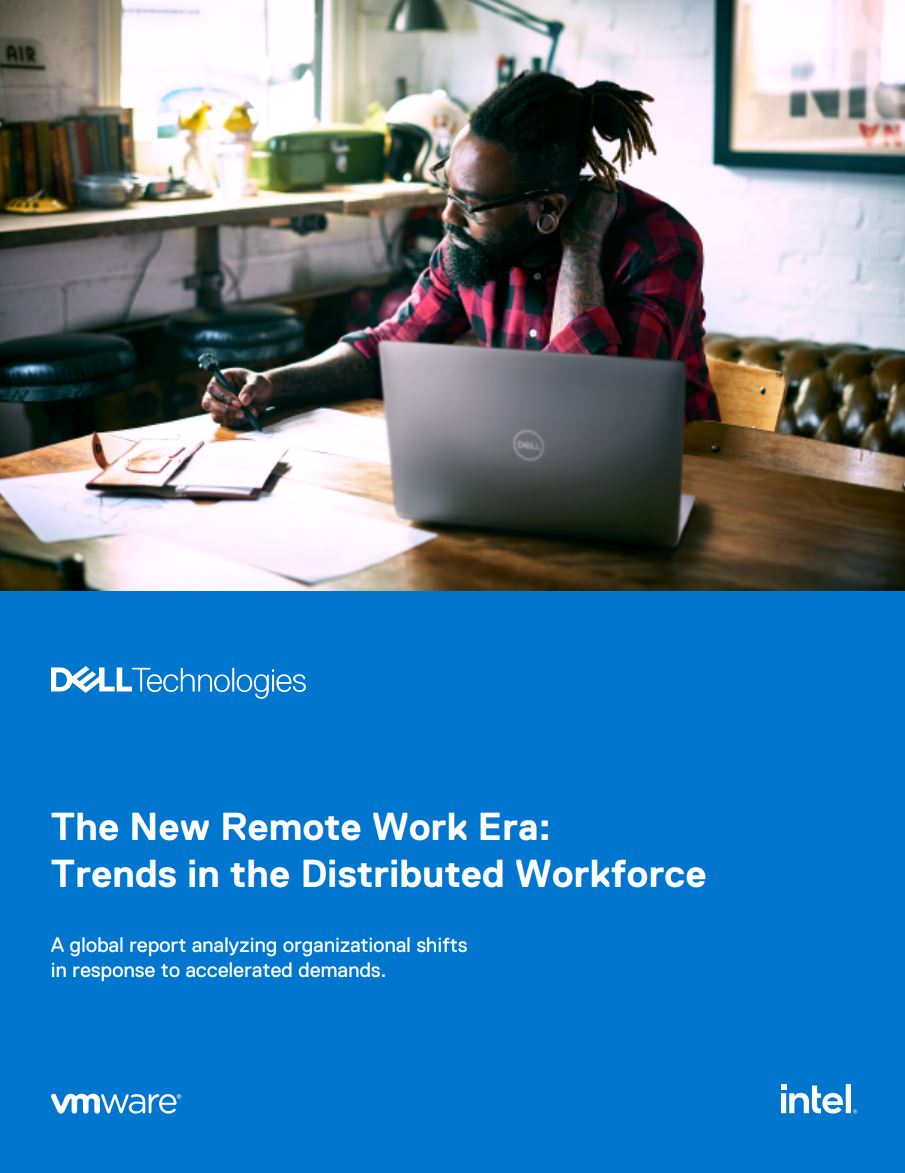Five top benefits of a dynamic work model for both your employees and your business
How flexible policies make your organisation more resilient to future disruption

As many of us have become used to a remote working model as a result of the COVID-19 pandemic, businesses have had to consider a new approach to their flexible working policies.
Not only is there a requirement for organisations to protect themselves from disruption in the future, but they also need to find a solution in response to their employees who’ve expressed they’d like to continue working from home.
In fact, a recent study by the ONS found that 57% of Londoners worked from home during May 2020 and May 2021, and almost 90% of UK employees said they’d like to work from home in some capacity on an ongoing basis.
RELATED RESOURCE

Companies can no longer assume that the distractions of home life will affect productivity, as employees have successfully contributed to the continuation of work (41% of people in the UK reported the same level of productivity).
Those businesses that can introduce a hybrid, or flexible working policy will not only retain their staff’s skill sets, they’ll also attract future talent. Companies are getting wiser to this with adverts promoting remote working at 307% of the average level in February 2020 and almost 1/5th of UK businesses looking to switch to remote working completely.
Here we share five of the top benefits a flexible return to work policy will bring to your business that takes employee needs into consideration and contribute to continued business success.
1. Higher job satisfaction
While remote work was a rising trend before the pandemic, only 6% of UK workers were fully remote at the beginning of 2020, and the office was still the standard. The idea of the over-exhausted employee 'on the grind' was also a standard, a common image that many had come to view as a marker of success.
Get the ITPro daily newsletter
Sign up today and you will receive a free copy of our Future Focus 2025 report - the leading guidance on AI, cybersecurity and other IT challenges as per 700+ senior executives
Despite this way of working that a majority of us bought into, flexible policies are actually what contributes to higher job satisfaction. Back in 2018, 87% of people reported wanting to work remotely, and after having a taste of remote work out of necessity, 62% of senior executives and 58% of entry-level workers reported wanting a combination of remote work and in-office days, in a nationwide survey last September.
Allowing your employees to choose their hours and location is part of how you show them you value their life outside of work, and so it makes sense that flexible policies would increase job satisfaction.
For the wider business, this means less turnover, less time advertising roles, advertising, and onboarding, and a workplace (however distributed) full of employees who will work harder for a company they feel cares about them.
2. Increased productivity
Although remote working has been out of necessity this time around, 58% of workers reported higher productivity in this survey, and 35% of business leaders said their teams are working more collaboratively.
Whether the home environment is quieter or more comfortable, the office environment is too distracting, or remote workers are just happier for a number of reasons that results in better performance, those working from home are generally more productive.
Cloud applications and services are a vital component to ensuring this performance continues in the long term. Employees need real-time communication platforms to help them collaborate effectively, and security strategies must keep up with the distributed workforce. Organisations will likely need to invest more in their cloud infrastructure and maintain updated tools for measures like identity and access management, but there's a big pay-off when employees are satisfied, productive, and secure.
3. Better work/life balance and less burnout
Employees that get to choose the location and hours that best fit their outside commitments by definition have a better balance between work and life.
They have a healthier relationship with work, which can increase the quantity and quality of their output, but also means that when anything bad happens, they aren't so burnt out they can't handle it.
When we look at what a resilient employee looks like, research shows they don't actually take work as seriously as that outdated image of being 'on the grind'. Rather than working themselves to the bone, they have a work/life balance that helps them avoid burnout and manage any stressors that crop up at work.
4. Better workplace culture
Some businesses are staunch supporters of traditional work, like Google, which has claimed hybrid work would increase their costs and destroy company culture. However, Phil Jones MBE, managing director of Brothers UK, maintained in a statement to IT Pro's The Business Briefing that the office would be more about building social relationships and renewing company culture than before.
By keeping the office open for collaboration and social events (as well as those employees who prefer to work there full-time), businesses can uphold and even improve company culture. Fostering strong relationships means a more connected workforce that can present a unified front in the face of major change.
5. Stronger, more diverse pool of applicants
With increased value placed on flexible policies over other perks, it stands to reason that an employer offering flexible work will have more applicants for a job, from which it can choose top-tier talent.
You're also not restricting yourself to applicants in the immediate area. When employees don't have to come into the office, there's more equality of access for people who can't afford to live in bigger cities or who have family commitments, long-term illnesses, physical disabilities, or any other limitations on coming into work for the typical 9-5.
Preparing for the future
The pandemic highlighted how many organisations' crisis plans were too rigid to adapt to disruption as swift and enormous as COVID-19. The struggle to set up entire workforces for effective and secure remote work overnight made organisations realise just how much reliance they had on the office as the centre of work and network security.
How a business returns to work, therefore, will have a big impact on how it stands up to the next disruption. Through a flexible work policy, businesses stand to better retain their current employees and improve their overall happiness and performance, while also attracting the best talent from any location.
When your business runs on a strategy of flexibility, it and all of the employees within it will be much more adaptable to stress and major changes.
-
 Bigger salaries, more burnout: Is the CISO role in crisis?
Bigger salaries, more burnout: Is the CISO role in crisis?In-depth CISOs are more stressed than ever before – but why is this and what can be done?
By Kate O'Flaherty Published
-
 Cheap cyber crime kits can be bought on the dark web for less than $25
Cheap cyber crime kits can be bought on the dark web for less than $25News Research from NordVPN shows phishing kits are now widely available on the dark web and via messaging apps like Telegram, and are often selling for less than $25.
By Emma Woollacott Published
-
 Young tech professionals are shunning a full-time return to the office – unless it pays more
Young tech professionals are shunning a full-time return to the office – unless it pays moreNews Young tech professionals who entered the workforce post-pandemic expect on-site work to be paid more than remote options.
By Emma Woollacott Published
-
 ‘Employers must look at the bigger picture’: Brits aren’t keen on going back to the office, and enterprises pushing for it risk a talent exodus – 48% of UK professionals would quit if faced with a full RTO mandate as hybrid work remains popular
‘Employers must look at the bigger picture’: Brits aren’t keen on going back to the office, and enterprises pushing for it risk a talent exodus – 48% of UK professionals would quit if faced with a full RTO mandate as hybrid work remains popularNews Nearly half of professionals would consider quitting rather than returning to the office full time
By Nicole Kobie Published
-
 IT professionals aren’t budging on flexible work demands – and more than half say they’ll quit if employers don’t meet expectations
IT professionals aren’t budging on flexible work demands – and more than half say they’ll quit if employers don’t meet expectationsNews Analysis from Randstad shows 40% of UK-based IT pros have quit over a lack of flexible work options, while 31% of workers globally have done the same.
By Ross Kelly Published
-
 'The tide seems to be turning towards office attendance': 64% of hybrid business leaders want staff back in the office – but many worry that enforcing RTO mandates will drive employees away
'The tide seems to be turning towards office attendance': 64% of hybrid business leaders want staff back in the office – but many worry that enforcing RTO mandates will drive employees awayAnalysis Many UK business leaders want their staff back in the office more frequently, but they’re scared to implement return to office (RTO) mandates in fear of worker revolts.
By George Fitzmaurice Published
-
 Employees are dead set on flexible working arrangements – three quarters would turn down a role that didn't offer hybrid options as work-life balance becomes more important than pay
Employees are dead set on flexible working arrangements – three quarters would turn down a role that didn't offer hybrid options as work-life balance becomes more important than payNews New research shows workers are increasingly demanding flexible working arrangements from employers.
By Emma Woollacott Published
-
 Rugged devices
Rugged devicesWhitepaper A closer look at the challenges and rewards of fully supporting a flexible workplace
By ITPro Published
-
 Secure, flexible remote working
Secure, flexible remote workingWhitepaper A closer look at the challenges and rewards of fully supporting a flexible workplace
By ITPro Published
-
 Work smarter, not harder
Work smarter, not harderWhitepaper A closer look at the challenges and rewards of fully supporting a flexible workplace
By ITPro Published